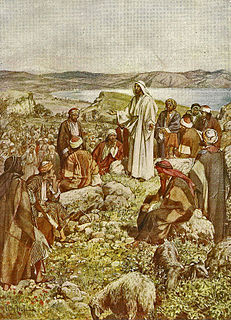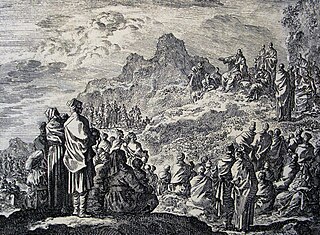
Matthew 3:7 is the seventh verse of the third chapter of the Gospel of Matthew in the New Testament. The verse occurs in the section introducing John the Baptist. In this verse John attacks the Pharisees and Sadducees.

Matthew 3:11 is the eleventh verse of the third chapter of the Gospel of Matthew in the New Testament. The verse occurs in the section relating the preachings of John the Baptist. In this verse he predicts that he will be followed by someone much greater than himself. The main theme of this verse is that John will soon be supplanted by a much greater figure and that John's water baptism is just a preparation for the much greater baptism by fire and spirit that will occur under the second coming of the Christian messiah Jesus, an original Christian concept that, according to Jewish scholars, lacks any fundament in the Hebrew scripture.
Testimony to integrity and truth refers to the way many members of the Religious Society of Friends (Quakers) testify or bear witness to their belief that one should live a life that is true to God, true to oneself, and true to others. To Friends, the concept of integrity includes personal wholeness and consistency as well as honesty and fair dealings. From personal and inward integrity flow the outward signs of integrity, which include honesty and fairness. It is not only about telling the truth but also about applying ultimate truth to each situation. For example, Friends (Quakers) believe that integrity requires avoiding statements that are technically true but misleading.

Matthew 5 is the fifth chapter of the Gospel of Matthew in the New Testament. It contains the first portion of the Sermon on the Mount, the other portions of which are contained in chapters 6 and 7. Portions are similar to the Sermon on the Plain in Luke 6, but much of the material is found only in Matthew. It is one of the most discussed and analyzed chapters of the New Testament. Warren Kissinger reports that among Early Christians no chapter was more often cited by early scholars. The same is true in modern scholarship.

Matthew 5:14 is the fourteenth verse of the fifth chapter of the Gospel of Matthew in the New Testament. It is part of the Sermon on the Mount, and is one of a series of metaphors immediately following the Beatitudes.

Matthew 5:20 is the twentieth verse of the fifth chapter of the Gospel of Matthew in the New Testament and is part of the Sermon on the Mount. Jesus has reported that he came not to destroy the law, but fulfill it. But in this verse, he makes clear that the common understanding of the Law is not enough.

Matthew 5:33 is the thirty-third verse of the fifth chapter of the Gospel of Matthew in the New Testament and is part of the Sermon on the Mount. This verse is the opening of the fourth antithesis, beginning the discussion of oaths.

Matthew 5:34 is the thirty-fourth verse of the fifth chapter of the Gospel of Matthew in the New Testament and is part of the Sermon on the Mount. This verse is part of either the third or fourth antithesis, the discussion of oaths.

Matthew 5:35 and Matthew 5:36 are the thirty-fifth and thirty-sixth verses of the fifth chapter of the Gospel of Matthew in the New Testament. They are part of the Sermon on the Mount. These verses are part of either the third or fourth antithesis, the discussion of oaths. Jesus tells his listeners in Matthew 5:34 "to swear not at all" and in here presents examples of unacceptable swearing.

Matthew 5:39 is the thirty-ninth verse of the fifth chapter of the Gospel of Matthew in the New Testament and is part of the Sermon on the Mount. This is the second verse of the antithesis on the command: "eye for an eye". In one of the most famous verses in the New Testament, Jesus here rejects revenge and retaliation, instead telling his followers to turn the other cheek.

Matthew 5:44, the forty-fourth verse in the fifth chapter of the Gospel of Matthew in the New Testament, also found in Luke 6:27–36, is part of the Sermon on the Mount. This is the second verse of the final antithesis, that on the commandment to "Love thy neighbour as thyself". In the chapter, Jesus refutes the teaching of some that one should "hate [one's] enemies".

Matthew 6:1 is the first verse of the sixth chapter of the Gospel of Matthew in the New Testament and is part of the Sermon on the Mount. This verse begins the discussion of how even good deeds can be done for the wrong reasons.

Matthew 6:2 is the second verse of the sixth chapter of the Gospel of Matthew in the New Testament and is part of the Sermon on the Mount. This verse continues the discussion of how even good deeds can be done for the wrong reasons.

Matthew 7:3 is the third verse of the seventh chapter of the Gospel of Matthew in the New Testament and is part of the Sermon on the Mount. This verse continues the discussion of judgmentalism.

Matthew 7:11 is the eleventh verse of the seventh chapter of the Gospel of Matthew in the New Testament and is part of the Sermon on the Mount. This verse summarizes the preceding metaphors in favour of prayer.

Matthew 7:17 and Matthew 7:18 are the seventeenth and eighteenth verses of the seventh chapter of the Gospel of Matthew in the New Testament and is part of the Sermon on the Mount. This verse continues the section warning against false prophets.

Matthew 7:21 is the twenty-first verse of the seventh chapter of the Gospel of Matthew in the New Testament and is part of the Sermon on the Mount. This verse continues Jesus' warning against false prophets.
Matthew 11:9 is the ninth verse in the eleventh chapter of the Gospel of Matthew in the New Testament.
Matthew 9:28 is a verse in the ninth chapter of the Gospel of Matthew in the New Testament.

Matthew 15:27 is a verse in the fifteenth chapter of the Gospel of Matthew in the New Testament.

















